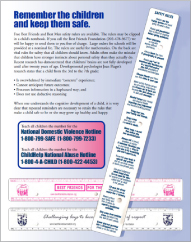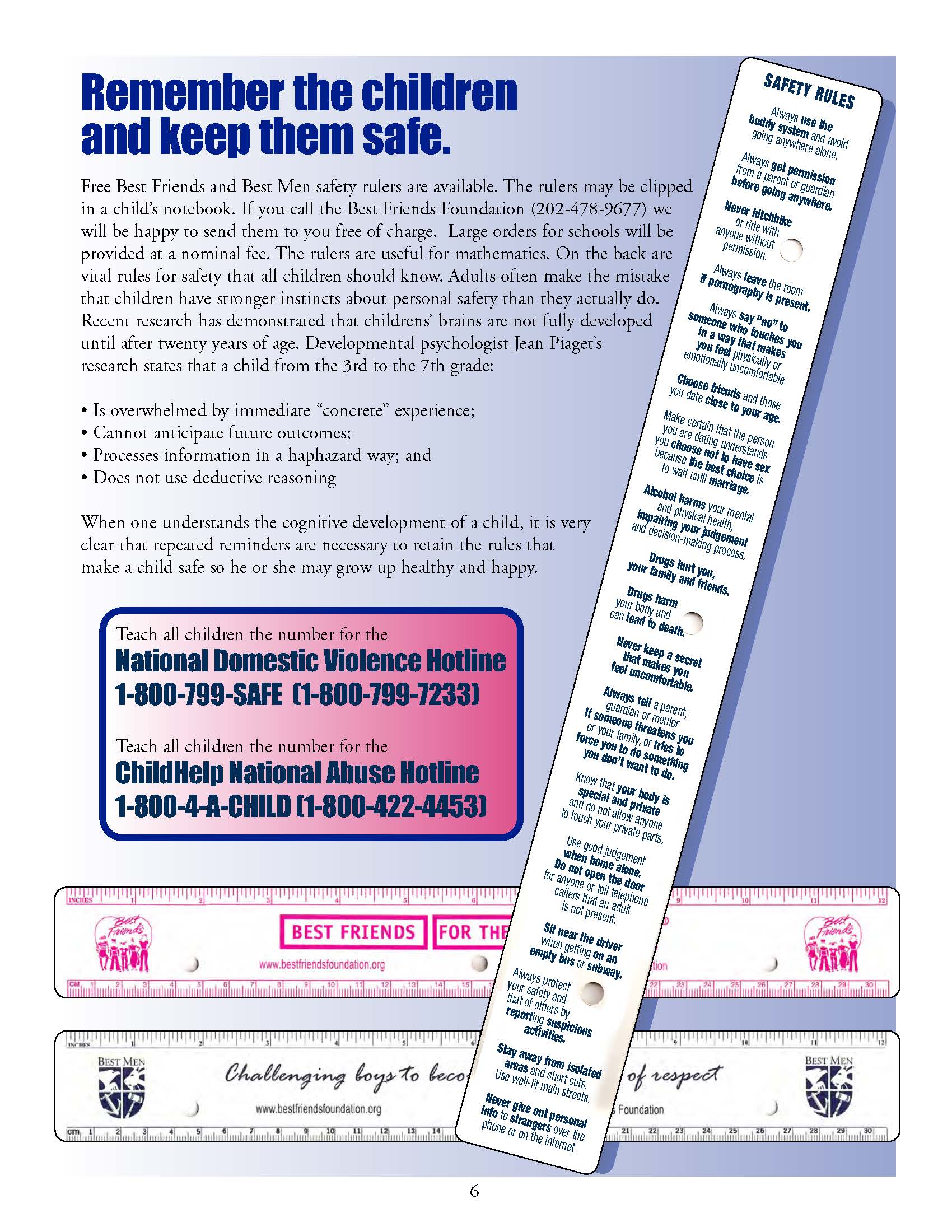Tips for Talking about Risk Behavior With Your Children
The following information is provided by the Best Friends Foundation over 30 years of experience working with adolescent girls with guidance provided in the National Longitudinal Study of Adolescent Health and ‘Ten Tips for Parents: To Help Their Children Avoid Pregnancy” published by the National Campaign to Prevent Teen Pregnancy.
1. Be clear about your own sexual values and attitudes.
The programs of the Best Friends Foundation teach that the best decision is to avoid sex until marriage a long-term mutually exclusive relationship.
2. Talk with your children early and often about sex- and be specific.
Kids have lots of questions about sex, and they often say that the source they’d most like to go to for answers is their parents. Start the conversation, and make sure that it is honest, open, and respectful. If you can’t think of how to start the discussion, consider using situations shown on television or in movies as conversation starters. Tell them candidly and confidently what you think and why you take these positions. Be sure to have a two-way conversation, not a one-way lecture. Ask them what they think and what they know so you can correct any misconceptions. Ask what, if anything, worries them. Age-appropriate conversations about relationships and intimacy should begin early in a child’s life and continue through adolescence. Resist the temptation to believe that there should only be one conversation. If you have regular talks, you won’t worry so much about making a mistake or saying something that is not quite right.
Research clearly shows that talking with your children about sex does not encourage them to become sexually active. The National Longitudinal Study on Adolescent Health found that teenagers who clearly perceive that their parents disapprove of them being sexually active, using contraception or getting pregnant are significantly less likely to have early intercourse. New studies point to the influence parents can have on their child’s sexual activity. Forty-five percent of teenagers said that parents were the ones who swayed their decisions about sex.
Here are the kinds of questions that children say they want to discuss:
- How do I know if I’m in love?
- Adolescents should know that there is a difference between love and sex. Love takes time to develop. Sex is never a test of love. A true boyfriend is a guy who is your friend, a person around who you are a better person, who wants the best for you, and who will respect your commitment not to have sex.
- How do I tell my boyfriend that I don’t want to have sex without losing him or hurting his feelings?
- Best Friends girls learn to tell boys early in a relationship that they have standards and do not engage in premarital sex, drugs, or alcohol. Girls learn refusal skills and how to say “no.” A boy who continues to pressure them for sex is not a real friend and is not worth keeping. Best Friends girls support one another’s decisions to wait to have sex. Best Friends provides better things to do, better ways to have fun as an adolescent free of the complications of sexual activity, so they can develop into healthy, accomplished young ladies. Tell your children what you think. Don’t be reluctant to say, for example:
- “I expect you to wait until the right time in your life to have sex.”
“I think teenagers are too young to have sex, especially with all of today’s risks.”
“One of the reasons I am concerned about teenage drinking is because it often leads to sex.”
“You don’t have to have sex to keep a boyfriend. If sex is the price of a close relationship, find someone else.”
And remember, too, that your own behavior should match your words. The “do as I say, not as I do” approach is bound to fail with children and teenagers, who are careful and constant observers of the adults in their lives.
3. Supervise and monitor your children.
Establish rules, curfews, and standards of expected behavior, preferably through an open process of family discussion and respectful communication. One of the most important pieces of advice in protecting children from early sexual activity is to never leave your child unsupervised. According to Child Trends, children in self-care may be at increased risk for accidents and injuries, for social and behavior problems, and for academic and school adjustment problems.
4. Know your children’s friends and their families.
Friends have a strong influence on each other, so help your children and teenagers become friends with kids whose families share your values. A study from the National Campaign to Prevent Teen Pregnancy found that friends were the second most influential group (31%) in their decision about whether or not to have sex. Conversely, research supports the widespread belief that peers play an important role in adolescents’ lives. Adolescents who believe their friends are having sex are more likely to have sex at an early age. It is easier to enforce a curfew that all of your child’s share rather than one that makes her different-but even if you views don’t match those of other parents, hold fast to your convictions. Welcome your children’s friends into your home and talk to them openly. The National Study on Adolescent Health found that when an adolescent has a circle of 50 or more friends with low-risk behavior, they are more likely to exhibit low-risk behavior. Teenagers with sexually active friends are more likely to have sex themselves, states Youth and Society. But, as Child Trends states, “It is not just peers’ behavior that matters; it is also teens’ perceptions of their behavior.”
5. Discourage early, frequent and steady dating.
Group activities among young people are fine and often fun, but allowing teens to begin steady, one-on-one dating much before age 16 can lead to trouble. Let your child know about your strong feelings about this through childhood don’t wait! Best Friends girls and Best Men guys are encouraged to go places in groups and to select their friends carefully. They are cautioned to avoid people and situations that make them feel uncomfortable or where there is pressure to engage in sex or use drugs and alcohol. They should always have a plan to get home and have money with them to call parents or take a taxi home.



